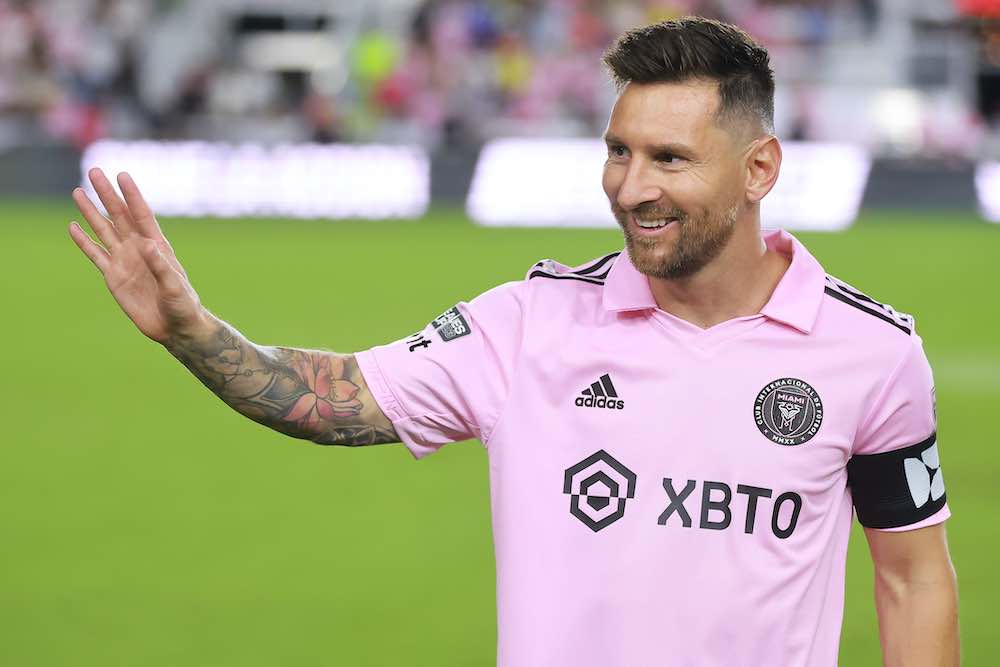By Mike Rice.
The Messi Effect is drawing celebrities and crowds out to see Inter Miami and the league is clearly enjoying the fanfare which follows the Argentine striker.
We heard from coaches around Major League Soccer in the near never-ending build-up to his arrival how they were excited to have him in the league, even though it was their teams that would end up facing him.
Inter Miami themselves have now managed to go from being a bottom-of-the-conference team to competing for Leagues Cup and Open Cup titles as well as ready for a playoff push and a shot at MLS Cup. Messi’s amigos coming in — Sergio Busquets and Jordi Alba — raise the level and the South Florida side are a completely new beast.
But, other than the profile of the league, why were other teams happy for Messi to arrive and what has it done for them?
In one word, signings.
With the profile of the league raised with the arrival of Messi, there has become a new category of player keen to ply their trade in MLS.
There have been the stages of ageing former stars as well as young South Americans, but now there is the chance to bring in players in their prime. A number come to mind from the beginning of the season to the summer window which just closed.
Evander joined Portland Timbers in a huge $10 million deal and his arrival was while he was the highest assist creator in the Europa League with former club FC Midtjylland.
LAFC brought across Timothy Tillman and highly rated Stipe Biuk from European sides and continue to attract players keen to develop in the league.
Sam Surridge has left Premier League side Nottingham Forest for the chance to be a Designated Player and key centre forward at an ambitious Nashville SC team.
Expansion side St Louis City SC also kicked off their life in MLS with Roman Bürki between the sticks after leaving Borussia Dortmund who even at 32 would have had plenty of suitors in top European leagues.
These are just a handful of players who have come into MLS with aspirations of developing their careers further.
In this summer transfer window, the Vancouver Whitecaps were able to strengthen their squad with the addition of two World Cup experienced fullbacks in Sam Adekugbe and Richie Laryea. Both Canadians from European sides whose level of ability could have seen them continue their careers abroad but have seen the opportunities which MLS can provide.
As roster rules constrict at times, the arrival of Messi and the desire to grow with the competition for signings, these rules could be loosened.
With three Designated Players (players who can be paid totals which aren’t part of the salary cap currently set at $612,500) allowed as well as Young DPs and the U22 initiative, the league has continued to adapt to its growth since 1996.
Mix in Targeted Allocation Money (TAM) of which each team has $2,720,000 to supplement the salary cap, it gets quite complicated. So complicated that Inter Miami were under further restrictions for a previous offence where they had one-too-many DPs on their roster two seasons ago.
These salary restrictions have helped ensure that the league has good parity, where if a team runs themselves well, they can compete at any time for a title. It has also ensured that MLS has been a financially secure league, with just one side in its history leaving the league.
Fans have enjoyed the product on the field in recent seasons, and it has shown year-on-year improvements, especially highlighted by Seattle Sounders becoming the first MLS side to win the CONCACAF Champions League last season.
But owners, like fans, want to keep pushing on, and the arrival of Messi and the Apple TV deal the league has signed is putting pressure on the league to adapt further to be competitive with leagues around the world.
There is more money in the Mexican Liga MX and their sides have been regular winners of CONCACAF tournaments and this is something MLS teams want to change, especially with the new introduction of the Leagues Cup as well.
Adding this extra tournament has piled on the number of games teams play each season. With this in mind, the squad depth has been called into question. With the restrictions on wages, having a deep squad, allowing rotations and securing the safety of players from injury from a hectic schedule, and an increase in salary cap could help this.
All in all, something needs to give, and MLS needs to keep up with the ambition of sides like Inter Miami bringing in some of the world’s best players, and in Messi’s case, the best.


COMMENTS